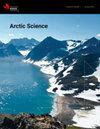Environmental drivers of beluga whales distribution in a changing climate: A case study of summering aggregations in the Mackenzie Estuary and Tarium Niryutait Marine Protected Area
IF 3.2
3区 地球科学
Q2 ECOLOGY
引用次数: 0
Abstract
During summer, the Eastern Beaufort Sea beluga whale population aggregates in the waters of the Mackenzie Estuary and Tarium Niryutait Marine Protected Area (TN MPA). Guided by local communities’ priorities, this study aimed to better understand beluga summer habitat selection and to examine whether shifts in beluga distribution are expected under a changing climate. We used a resource selection function (RSF) based on aerial survey data and satellite remote sensing images to estimate the likelihood of beluga presence as a function of environmental conditions. The RSF revealed belugas selected warm and turbid waters, with suspended particulate matter concentrations and sea surface temperatures ranging above average estuarine values. These specific conditions support hypotheses on the ecological roles of estuaries for belugas such as providing a thermal advantage for their calves or for belugas epidermal moulting. Using a diachronic analysis, we found a distribution shift towards coastal and inshore waters, areas already experiencing effects of climate change. Thus, the current distribution may reflect beluga responses to a changing climate, selecting warmer and more turbid areas. Our finding provides insight into current and evolving beluga habitat and habitat selection under a changing climate, that may help inform beluga management in the TN MPA.气候变化下白鲸分布的环境驱动因素:以麦肯齐河口和Tarium niryutai海洋保护区夏季聚集为例
夏季,东波弗特海白鲸种群聚集在麦肯齐河口和塔里姆尼柳泰海洋保护区(TN MPA)水域。根据当地社区的优先事项,本研究旨在更好地了解白鲸夏季栖息地的选择,并研究在气候变化的情况下白鲸的分布是否会发生变化。利用基于航空调查数据和卫星遥感图像的资源选择函数(RSF)来估计白鲸存在的可能性作为环境条件的函数。RSF发现,白鲸选择温暖浑浊的水域,悬浮颗粒物浓度和海面温度都高于河口的平均水平。这些特殊的条件支持了关于河口对白鲸的生态作用的假设,例如为它们的幼鲸提供热优势或白鲸表皮蜕皮。通过历时分析,我们发现分布向沿海和近岸水域转移,这些地区已经受到气候变化的影响。因此,目前的分布可能反映了白鲸对气候变化的反应,它们选择更温暖、更浑浊的地区。我们的发现提供了对当前和不断变化的白鲸栖息地和气候变化下的栖息地选择的见解,这可能有助于为田纳西州海洋保护区的白鲸管理提供信息。
本文章由计算机程序翻译,如有差异,请以英文原文为准。
求助全文
约1分钟内获得全文
求助全文
来源期刊

Arctic Science
Agricultural and Biological Sciences-General Agricultural and Biological Sciences
CiteScore
5.00
自引率
12.10%
发文量
81
期刊介绍:
Arctic Science is an interdisciplinary journal that publishes original peer-reviewed research from all areas of natural science and applied science & engineering related to northern Polar Regions. The focus on basic and applied science includes the traditional knowledge and observations of the indigenous peoples of the region as well as cutting-edge developments in biological, chemical, physical and engineering science in all northern environments. Reports on interdisciplinary research are encouraged. Special issues and sections dealing with important issues in northern polar science are also considered.
 求助内容:
求助内容: 应助结果提醒方式:
应助结果提醒方式:


